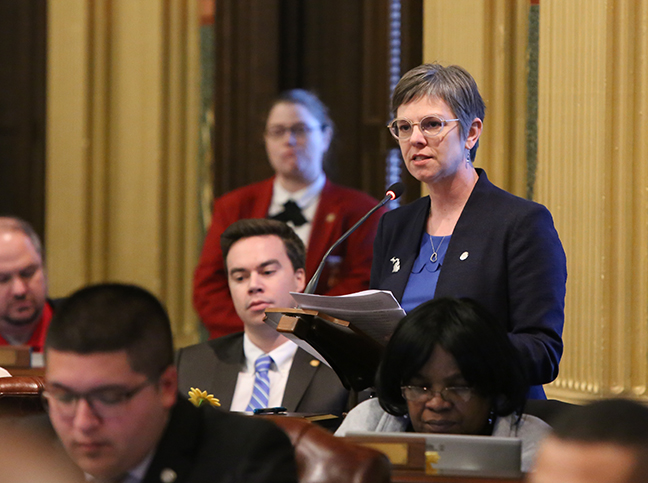Just over a year ago, during the Nov. 8 midterm election, Michigan voters overwhelmingly voted to pass Proposal 3, a ballot measure designed to enshrine abortion rights in the state constitution.
One year later, legislators and activists on both sides of the abortion debate continue to spar on how the promises created by the proposal should be achieved in practice.
Genevieve Marnon, the legislative director at Right to Life of Michigan, said there was “a tremendous amount of disappointment” for anti-abortion activists following the results of the midterm election.
Marnon said she attributes the results to a few reasons including being outspent three to one by pro-abortion groups, a lack of support from national anti-abortion groups, and Gov. Gretchen Whitmer’s outspoken support for Proposal 3.
“We knocked thousands of doors, we manned the polls, we sent out information, we did ads to the best of our ability given our limited budget,” Marnon said. “But when the other side can outdo you three to one, it makes it harder to get your message out.”
Additionally, Marnon said pro-abortion groups inappropriately used fear to motivate voters and blamed news media for not properly fact-checking pro-abortion claims.
“How many times did you hear during the Proposal 3 campaigns that women are going to die?” Marnon asked rhetorically. “Over and over and over we heard that lie and it was never fact-checked. And I blame the media on that one.”
Michigan state Rep. Julie Brixie (D-Meridian Twp.) said she considered Proposal 3’s success to be “an enormous victory” for pro-abortion groups and also credits the proposal for propelling Democrats to their first trifecta since 1984.
“Having been an elected official for over 20 years and caring a lot about this issue (…) It was really satisfying to see that, in fact, tons of people support women’s right to abortion period,” Brixie said. “That was a really great feeling.”
With abortion rights now enshrined in Michigan’s constitution, legislative battlegrounds have shifted to the specifics of how Michiganders will be able to access reproductive care ranging from Medicaid funding to parental consent.
Most recently, Michigan Democrats were forced to settle for a skimmed-down version of the Reproductive Health Act, or RHA, that, although managing to allow for private health insurance to cover abortions and removing some restrictions on abortion clinics, did not secure Medicaid funding for abortions and did not remove the mandatory 24-hour waiting period for abortions.
“Those were things that a lot of people wanted,” Brixie said. “We simply didn’t have the votes to get it passed.”
Marnon, however, said the legislative items dropped from the RHA were unpopular with voters to begin with, citing polling data that indicated:
- 72% of all voters support the 24-hour waiting period to allow for informed consent
- 70% of all voters support parental consent for abortions
- 59% of Michigan voters do not believe their tax dollars should be used to pay for abortions in Michigan
Looking ahead, Brixie said removing parental consent for abortions, the 24-hour waiting period, and supporting Medicaid-funded abortions, all components of the RHA that were eventually dropped, are the next important legislative goals for the Michigan pro-abortion movement.

“Those are three things that I think are really important and I’m hopeful that we can do some more work on,” Brixie said. “I don’t think that just because you are in the circumstance of needing Medicaid that you should have some of your rights taken away from you.”
Conversely, Marnon, while still advocating for an anti-abortion legislative agenda, said she would like to help create a culture change that makes it easier for women to choose options other than abortion. She said expanding help for women in crisis, streamlining abortion laws, and potentially passing “baby box” legislation to allow parents to surrender newborns.
“We want to work with our pregnancy resource centers and help strengthen them and expand them and really be out there reaching out to women in need,” Marnon said.